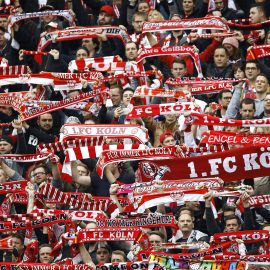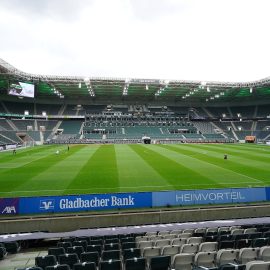Big name signings and Germany’s exciting World Cup run will trigger a more than 10 percent jump in Bundesliga international broadcasting rights revenues this season, the country’s football league chief said on Thursday.
“Internationally we have boosted our activities,” German football league (DFL) CEO Christian Seifert told Reuters in an interview the day before the new season kicks off.
“For 2010/11 we will have (international TV rights revenues) of over 40 million euros.”
The DFL, in charge of running Germany’s top two professional leagues, paid out about 30 million euros from international TV revenues to clubs last season and kept some funds for the cost of its own operation, he said without giving an overall figure.
“So definitely a double-digit increase,” he said, adding they had also more territories buying the rights worldwide this season, up from 138 to 208.
“The Bundesliga is a very attractive product. We had the largest number of World Cup players after the (English) Premiership,” he said, adding that Germany’s World Cup run and big name Bundesliga signings had contributed to that.
After Germany’s impressive performance in South Africa where they finished third, major European clubs have shifted their interest to the Bundesliga.
Former Real Madrid striker Raul joined Schalke 04 while Michael Ballack left Chelsea to return to Bayer Leverkusen. Mesut Ozil and Sami Khedira, both members of Germany’s World Cup squad, went the other way, signing for Real.
RECORD TURNOVER
The leagues’ turnover figures for the 2009/10 season, in which Bayern Munich clinched the domestic double and played in the Champions League final, are not expected to change from the 2008/9 all-time record of just over 2 billion euros.
“What I can forecast is that as we stand today they will not be dramatically different from the previous year despite the tough economic climate,” Seifert said a day after the DFL’s annual general meeting in Berlin.
“In the region of two billion euros turnover.”
German clubs have been less affected by the economic downturn than their English or Spanish counterparts but Seifert said it was still necessary to minimise the financial risk by forcing them to cut back on their debt this season.
“Until now we had the rule in the Bundesliga that if a club has negative equity then it is not allowed to get worse the next season,” he said.
“From this season (we decided) a club must improve negative equity, by 10 percent a season for Bundesliga clubs, five percent for second division clubs.”
“I think this it is the right signal at the right time.”
REDUCE DEBT
Half of Europe’s leading clubs are losing money with more than 20 percent facing huge deficits, European football’s governing body UEFA said earlier this year.
UEFA excluded financially-troubled Real Mallorca from this season’s Europa League in July. Like many Spanish clubs, they have been slipping ever further into the red due to spiralling wage and transfer costs.
“In Germany, some clubs have debts because they have built a brand new high-tech stadium that investors would immediately snap up knowing that these clubs will continue playing attractive football there and could pay suitable rent,” Seifert said.
“In other leagues there are massive debts and no big assets.
“I put a big question mark if there is anyone nowadays who would buy Cristiano Ronaldo for 90 million euros other than maybe Manchester City,” he said of Real Madrid’s record transfer last year.
Add Sportslens to your Google News Feed!






